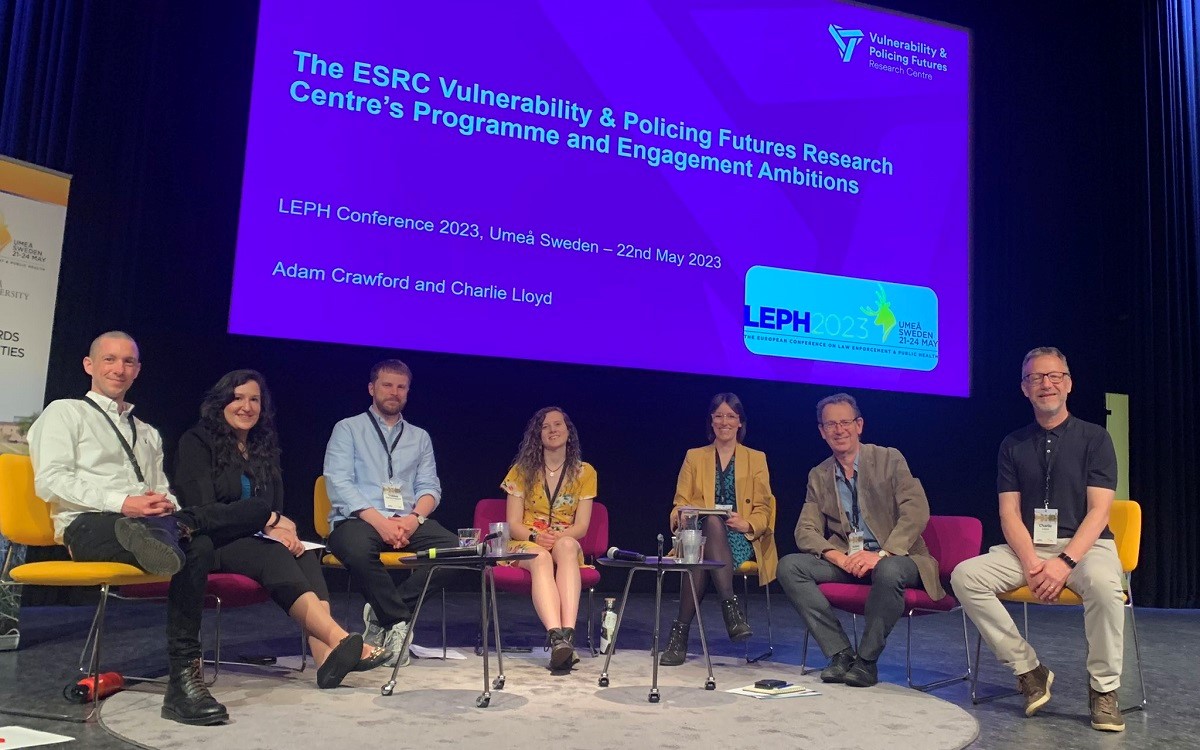Members of the ESRC Vulnerability & Policing Futures Research Centre have shared emerging findings from current Centre research projects at the Law Enforcement and Public Health (LEPH) 2023 conference in Umeå, Sweden.
23 May 2023
Beginning a series of talks, Co-Directors Professor Adam Crawford and Professor Charlie Lloyd introduced the panel session by outlining the Centre’s mission and approach to co-production and engagement across policy, practice and public arenas.
Bradford mapping research
Two of the papers explored research in Bradford, England. The first looked at how different vulnerabilities are distributed across the city and how Bradford’s services seek to support vulnerable people and prevent harm. The project combines insights from data science with qualitative research, exploring the experiences of vulnerable individuals and communities as well as services providers. While delivering their talk, Professor Crawford and Dr Larissa Engelmann particularly emphasised the project’s aim to understand how organisations can work together to reduce harm and foster improved services for vulnerable people.
Q methods study of vulnerability
The second talk focused on the concept of vulnerability and how it is understood and operationalised among service providers from police, health services, education, social care and other agencies and service users. Dr Kate Brown, Centre Deputy Director, said that despite an increased focus on ‘vulnerability’ across different organisations, debates about the rise of vulnerability in social support and criminal justice arenas remain largely disconnected.
Dr Brown spoke about the study’s use of the Q methodology. This mixed method combines rich qualitative data and the rigour of statistical analysis to analyse patterns in human subjectivity. It explores differing views on ‘vulnerability’ from the providers and receivers of core public services in Bradford.
Dr Brown noted that this study could help the Centre to understand more about how vulnerability governance can be advanced in ways that are most effective for public service provision and most beneficial for vulnerable people.
County lines policing and vulnerability
Another two sessions explored initial findings from projects looking at prevalent problems in policing vulnerability. The first covered the differing approaches to county lines among UK police forces. County lines is the term given to the practice of drug dealers from urban areas travelling to smaller towns to sell Class A drugs. The gangs involved usually operate across a number of different police force and local authority areas; vulnerable people are often recruited or pressurised into carrying and selling drugs.
Professor Lloyd, Dr Chris Devany and Dr Tobias Kammersgaard talked about their interviews with officers in UK police forces who have key responsibilities for county lines. The researchers revealed inconsistencies between police constabularies and even within constabularies when dealing with county lines drugs gangs. They shared their plans to develop a best practice guide for policing county lines.
Co-designing community resilience to online child sexual victimisation
The final session, led by Dr Engelmann and Dr Christine Weirich, looked at how different organisations respond to online child sexual victimisation (OCSV) in Blackpool, England. They spoke about the links between online and offline child sexual exploitation, as well as how the police, charities, voluntary groups and the public – particularly parents and children – identify and address OCSV and the links with vulnerability. They focused on current preventative efforts from organisations across police, education, health, social care and the voluntary sector in Blackpool.
Dr Engelmann and Dr Weirich then revealed plans to co-produce a local-based online child sexual exploitation quality standards framework and preventative tool with service providers and community members that can tackle local OCSV problems. Following an assessment of how effective the framework is, the team hopes to adopt it in different areas across the UK and beyond.
Engaging law enforcement and public health agendas
An engaged discussion with conference delegates explored the connections between policing vulnerabilities and approaches to law enforcement and public health. The panel provided a great opportunity for representatives of the Centre to engage with international researchers and practitioners in relation to allied themes and concerns.
Professor Crawford said: “It was great to be able to share updates from the Centre’s current research projects at LEPH 2023. Since the Centre began its work just over a year ago, the team has been working hard to build a knowledge base of how policing can better service the needs of vulnerable groups. Key to this is the combination of linked data with insights from lived experiences. By doing this, we hope to better understand how vulnerability relates to policing and other service providers, and how these findings can be used to build new, integrated and innovative approaches to harm reduction that address the needs of vulnerable groups.”
Professor Lloyd said: “It was great to present papers on our work across our research strands and identify cross-cutting themes that were discussed in response to questions after the presentations. There was also much discussion throughout the conference about the Centre’s programme and its links with other relevant work going on in the UK and other countries.”
LEPH 2023 takes place in Umeå, Sweden from 21-24 May and explores the complex and diverse intersections of law enforcement and public health.

